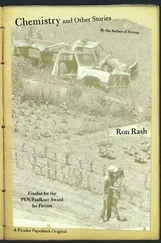"January," Pemberton answered.
"Amazing how much he favors you. Same eyes, same hair color."
Pemberton nodded at an invoice on the desk.
"I've got work to do, Sheriff."
"Where's your wife?"
"Out with the cutting crews."
"How far from here?"
"I don't know," Pemberton said. "She could be anywhere between here and the Tennessee line."
"That's convenient."
McDowell looked at the clock, kept his eyes on it a few moments.
"I'll be back," he said, and turned and walked toward the door, "and I'll have an arrest warrant next time."
Pemberton watched from his window as the sheriff got in his car and drove across the valley toward Waynesville. He went to the gun rack and opened the drawer beneath the mounted rifles. The hunting knife was in the same place as before, but when Pemberton pulled its elk-bone handle from the sheath, he saw that blood stained the blade. The blood was black, clotted. Pemberton scratched a fleck free and rubbed it between his thumb and forefinger. He felt a residue of moisture.
The phone rang and Pemberton almost didn't answer it, picking up the receiver only after the eighth ring. Calhoun was on the line, asking a question about the contract Serena had shown him and Lowenstein. Pemberton's voice felt hardly a part of himself as he told Calhoun that the paperwork was nearly done.
Pemberton did not set the receiver back on the hanger. Instead, he made a call to Saul Parton in Waynesville and left a message with the coroner's wife. The knife still lay on the desk, and Pemberton picked it up, briefly considered taking the weapon to the saw mill and throwing it in the splash pond. But it was, Pemberton reminded himself, his wedding present. For a few moments, he allowed that scalding thought to resonate through him. Then he wet a handkerchief with his spit and wiped off the blood. Pemberton slipped the knife in the sheath and placed it back in the gun rack's drawer. He picked up the receiver again and told the operator he wished to make a call to Raleigh.
Afterwards, Pemberton left the office and searched for Vaughn but had no luck. He did find Meeks in the dining hall, discussing next month's payroll with the head cook. The conversation was a halting exchange, the North Carolina highlander and New England yankee struggling with each other's dialects like two ill-trained interpreters.
"I've got to go to Waynesville," Pemberton told Meeks. "Stay in the office and answer the phone. If Saul Parton calls, tell him not to send his report to Raleigh until I see him."
"Very well," Meeks said with exasperation, "though I'm a bookkeeper, not a linguist. If your callers speak the same barbarous parlance as this fellow I'll have no idea what they are saying."
"If you see Vaughn, he can spell you. I'll be back as soon as I can."
As he drove out of the valley, Pemberton saw Galloway sitting on the commissary steps, a half-eaten apple in his hand, enjoying a day off for working late last night. Pemberton wondered if Galloway had seen the sheriff's car. As the Packard passed, Galloway's gray eyes looked up, but they were as blank and fathomless as his mother's.
McDowell's patrol car was parked outside the courthouse, a relief since Pemberton wouldn't have to search around town for him. Pemberton found a parking place and walked up the sidewalk, crossed the courthouse lawn. Only the desk's lamp was on when he entered the office, and Pemberton's eyes took a moment to adjust to the gloaming. McDowell was in the room's one cell pulling a dingy mattress off its spring base. As the sheriff did so, dust motes floated upward, suspended in the cell window's barred light as if in a web.
"Checking for hacksaws and files, Sheriff?"
"Bedbugs," McDowell replied, not looking up. "I suspect you and Mrs. Pemberton have them as well. They aren't particular about who they lay down with."
Pemberton seated himself in a rickety shuck bottom chair set in front of the sheriff's desk. Above, a ceiling fan stirred the air with no noticeable effect. McDowell took the mattress from the cell and down the narrow hall to the open back door and set it outside. He came back in and repositioned the regulator clock's calendar hand. Only then did he sit down behind his desk.
"Come to turn in your wife?" McDowell asked.
"I've come to make an offer for your cooperation," Pemberton said, "a final one."
"You know my answer. You've known it for three years."
Pemberton eased back into the chair he suspected the sheriff deliberately wanted uncomfortable, spreading his legs to better balance his two-hundred pounds.
"It's not just money this time. It's whether you want to continue being sheriff."
"Oh, I'm going to continue," McDowell replied. "I found me a fisherman who saw Galloway's Ford crossing the bridge near Colt Ridge last night. Since Galloway doesn't have a left hand, I'd say that kind of narrows who did the actual killing."
"I just got off the phone to a state senator who can have you fired within a week," Pemberton said. "You want to keep your job or not?"
McDowell looked intently at Pemberton.
"What's interesting to me is how you were surprised this morning. I guess I can take that a couple of ways, can't I?"
"I don't know what you're talking about," Pemberton answered.
"No, maybe you don't," McDowell said after a few moments. "Maybe you're such a worthless son-of-a-bitch that you wanted it done same as she did, but you were too gutless to go with her."
McDowell stood up, his chair scraping against the wood floor as he shoved it backward. He was not nearly as big a man as Pemberton, no more than five-ten. Yet there was a visible strength in McDowell's body, wiry but muscled in the biceps and forearms, wrists thicker than expected for his frame. No gun and holster clinched around the sheriff's waist. Pemberton stood up as well. It would be a good fight, Pemberton told himself, because the highlanders considered it a matter of honor never to cut and run, or quit once a brawl had begun. He'd be able to pummel McDowell for ten or fifteen minutes. Adrenaline surged through his veins, and with it Pemberton felt a revived sense of his own strength that had been dormant too long. The world suddenly became simpler than it had been in a long while.
But before they could start, there was a knock on the door, another soon after, still light but more insistent. McDowell looked toward the door. Pemberton thought the lawman would walk over and lock it, and perhaps he would have, but at that moment the brass doorknob turned and the door opened. An older woman, her gray hair tied in a taut bun, entered the office, behind her Rachel Harmon, the child in her arms.
Pemberton looked at Jacob and saw the sheriff was right about his features, even more obvious now than in January. He thought about the photograph of himself and wondered if Serena had found it last night as she searched for the hunting knife. She might have opened the desk drawer and found the album, turned the pages until she came to the last two. It suddenly occurred to Pemberton then that Serena might have taken not only the knife but also a photograph with her.
Sheer lunacy to imagine such a thing, Pemberton told himself, but his mind continued to assemble its own fevered logic. Pemberton remembered the glint of the knife blade when Serena stepped onto the porch last night. He tried to recall if something had been in her right hand as well. It could have easily been there, a photograph taken to confirm a child that, as far as Pemberton knew, Serena had never seen. Taken to make sure-except it wouldn't be the photograph of Jacob as an infant, Pemberton suddenly realized. Because even if Serena knew it was a picture of Jacob, she'd need a picture of the child the way he looked now , at two years of age. Serena would have taken the photograph of Pemberton.
Читать дальше












